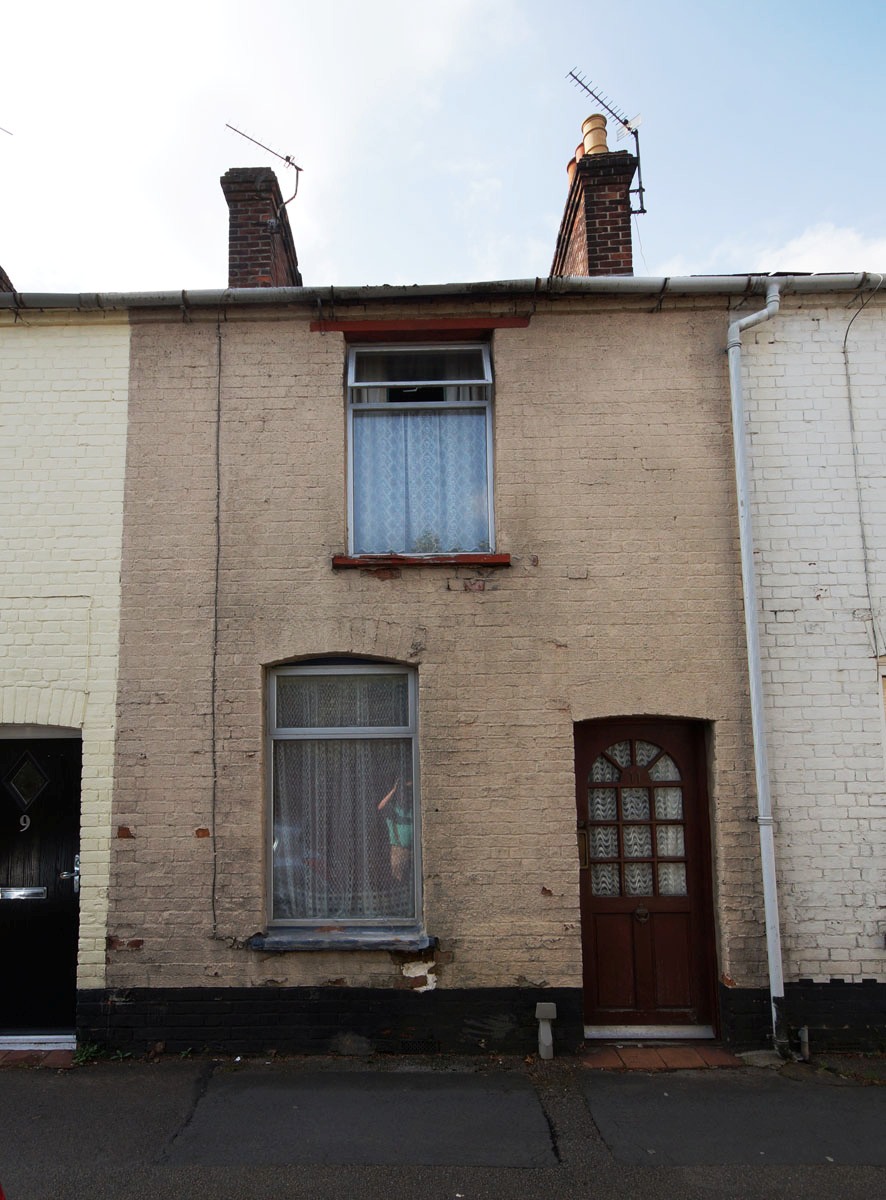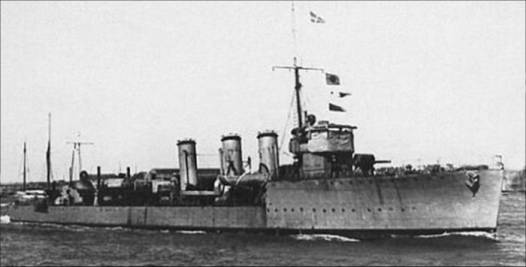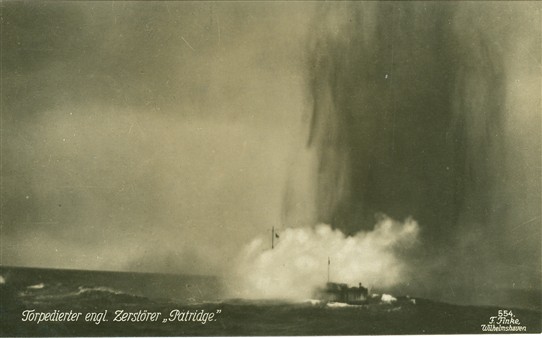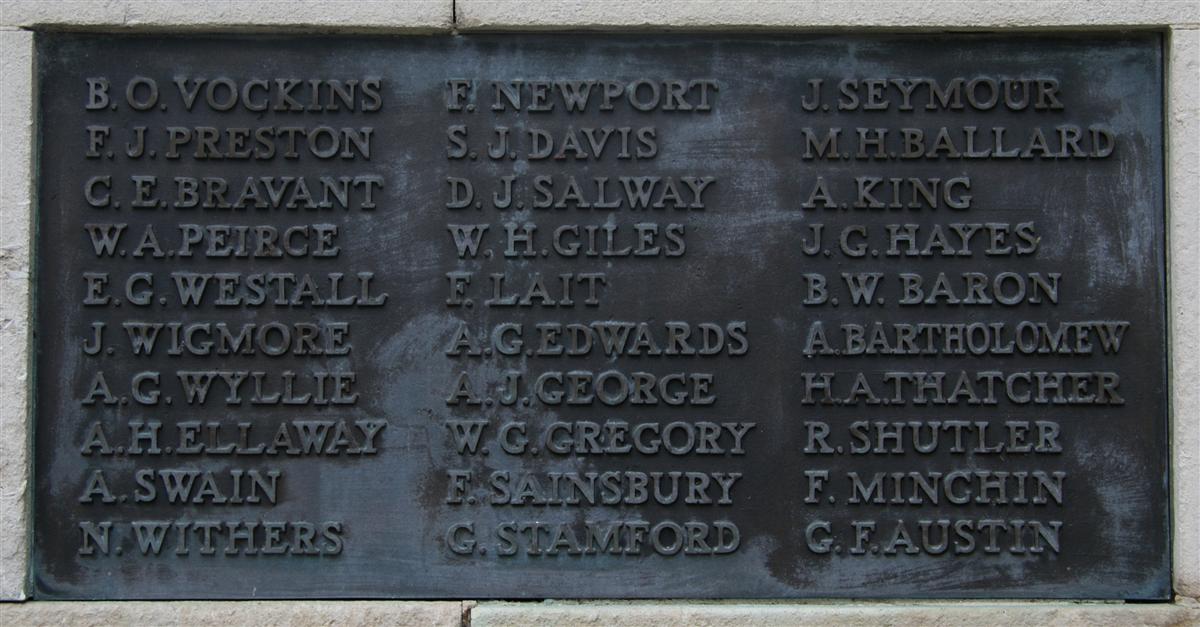Jesse Wigmore
Stoker Class I K/3221 Jesse Wigmore, HMS Partridge, Royal Navy.
Jesse was born in Bucklebury on 4 August 1888 the son of John Wigmore and his wife Elizabeth née Tucker. He was the second of the couple’s three children, all boys, the others being Henry (born in Newbury in 1884) and Ernest (Bucklebury, 1889).

11 Livingstone Road |
All three boys were enrolled at St Nicolas School, Newbury on 26 April 1898, which must have been shortly after the family to Newbury from Ecchinswell. They moved into a terraced house in Livingstone Road, known then as 2 East View Cottages it is now simply 11 Livingstone Road.
Strangely his parents knocked a year off Henry’s age when they sent him to St Nicolas’, perhaps they felt he needed an extra year at school? Jesse left school on 7 March 1902 to go and work for a local butcher, perhaps just as an errand boy, though he may have gone with a view to getting an apprenticeship and learning the trade. Whatever the intention he did not stay in the trade and, by 1909, was working as a groom, perhaps preferring his animals alive.
Then, on 17 June 1909, Jesse joined the Royal Navy. For some unknown reason he lied about his birth date, knocking two years off his age. His naval record shows that he was 5ft 3 ¾ in tall with a fair complexion, light brown hair and grey eyes.

HMS Partridge. |
He trained as a Stoker and was promoted to Stoker Class I in 1911. Having served on a number of ships he was posted to HMS Partridge, an M or Moon Class destroyer on 1 July 1916. When he heard of the casualties on the Somme that day he must have blessed his decision to join the senior service.
HMS Partridge was a part of the 14th Destroyer Flotilla based at Scapa Flow, the Navy’s huge anchorage in the Orkneys. On 11 December 1917 HMS Partridge was part of the escort of a small convoy of merchant ships crossing from Lerwick to Bergen in Norway. Leading the convoy was HMS Pellew (a sister ship of Partridge) and, together with four armed trawlers these navy ships formed the escort for six merchantmen. At 11.45am on 12 December the convoy was attacked by four German destroyers, all larger and better armed than the Pellew and Partridge. The Partridge was the first to be hit by a shell that cut her main steam pipe and left her dead in the water. She did fire a torpedo that hit one of the German destroyers, but failed to explode. She was then hit by a torpedo and the commander, Lt Cdr Reginald Hugh Ransome, gave the order to abandon ship; two further torpedo strikes finished her off and she sank with most of the crew still on board. The Germans also hit the Pellew forcing her out of the action and then proceeded to sink all four trawlers and the six merchantmen (allowing their crews to abandon their ships before they were sunk.
Among the survivors from the Partridge was John Bradley, an Engine Room Artificer (ERA) who later gave this account:
1917 Dec.12 I had the afternoon watch. At 11.50 the bell rang for Action Stations and we left our dinners and went below. Just about 12 o'clock firing started and by about 12.15 we had the H. P. Steam pipe shot away and the turbines stopped. At the same time the Port Turbine got smashed up. We were then ordered to leave the Engine Room. As the last man was leaving the Dynamo got hit.

The last moments of HMS Partridge - a dramatic picture from the German archives.. |
We got the midships raft into the water and put life belts on. I had one that someone else threw down. It had the white tape tied to the Blue. We went into the ditch at 12.20. It didn't seem too cold until we had been in the water for a time. We then pulled towards the German T.B. who picked us up. They let us dry our clothes in the Engine Room and gave us some rye bread and raw bacon to eat. Most of us went forward to sleep at night. I was in the foremost bunk and didn't sleep much.
[For more on John Bradley see: http://johnbradleyswar.co.uk/partridge.htm]
This was the second convoy lost to attacks by surface ships that year (the previous being on 17 October) and highlighted the weakness of the convoy protection, which was only designed to counter the U-boat threat. Subsequent convoys were sent with stronger escorts and the next German attack, early in 1918, failed - they never tried again.
Although initial reports were that the Partridge went down with all hands it was subsequently discovered that 3 officers and 21 ratings had survived – but 5 officers and 92 ratings did not.
Jesse was one of the 92 ratings who died; as a stoker his work was in the bowels of the ship and, unlike John Bradley, he was unable to get out in time. Perhaps he was killed by one of the shell and torpedo strikes, perhaps he drowned as the ship went down.
It seems to have been well over a month before his death was confirmed and his family notified. His mother placed a notice in the local paper:
Newbury Weekly News, 7 February 1918 – In Memoriam
WIGMORE – In ever loving memory of my dear son, Stoker J Wigmore, K3221, of HMS Partridge, who lost his life on December 12, 1917, aged 29 years. – Sleep on dear son in thy watery grave.
Had He asked us, well we know
We should cry, Oh spare this blow;
Yes, with streaming tears should pray,
Lord, we love him, let him stay.
From his sorrowing Mother and Brother.

Jesse's name on Newbury War Memorial. (middle left) |
As he went down with the ship his body was never recovered; he is remembered on the Naval Memorial at Portsmouth (panel 26).
Locally he is remembered on tablet 4 of the Newbury Town War Memorial.
He was also remembered in his parish church, St John the Evangelist’s in Newbury, where a memorial window was supplemented by a roll of honour board. Sadly both the window and board were destroyed when the church was bombed on 10 February 1943.
He was, of course, not forgotten by his family:
Newbury Weekly News, 12 December 1918 – In Memoriam
WIGMORE – In loving memory of my dear son and brother, 1st class stoker J Wigmore, who lost his life on the sinking of HMS Partridge, December 12th, 1917.
A bitter grief, a loss severe,
To part with one we loved so dear;
Though great our loss we will not complain,
But trust in God to meet again.
No loved ones stood beside him to hear his last farewell,
No word of comfort could he have from those who loved him well.

